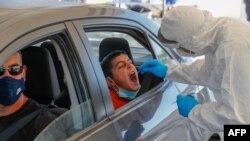The World Health Organization said Thursday it is important to test everyone who has been exposed to the coronavirus even if they are showing no symptoms.
WHO epidemiologist Maria Van Kerkhove said it's vital to test and trace anyone who has come in contact with a coronavirus patient, blaming the recent surge in cases around the world on clusters of people who are asymptomatic.
That advice from WHO directly contradicts the U.S. Centers for Disease Control and Prevention (CDC), which spent months calling for everyone who came in contact with a COVID patient to get tested regardless of symptoms but now says those tests are not needed.
The change stunned and puzzled many U.S. health officials, who say they suspect the new guidance may be politically motivated.
Several states said they have no plans at this time to listen to the new CDC testing guidelines.
Arizona, California, Connecticut, Florida, Illinois, Texas, New Jersey, and New York all said they plan to continue testing asymptomatic people.
"This 180-degree reversal of COVID-19 testing guidelines is reckless, and not based on science and has the potential to do long-term damage to the (CDC's) reputation," New York Gov. Andrew Cuomo said in a joint statement with Connecticut Gov. Ned Lamont and New Jersey Gov. Phil Murphy.
China suggests virus origin uncertain
China's top diplomat Thursday cast doubt on the widespread belief that the coronavirus originated in China.
"Actually, for the past months, we have seen reports...showing that the virus emerged in different parts of the world, and may have emerged earlier than in China," State Councilor Wang Yi said during a visit to Norway, speaking through an interpreter.
"Who is patient zero? It is still unknown," Wang asked, while adding that a probe into when and where the virus began should be left to scientists, not politicians.
There has yet to be an international investigation led by the WHO into the origins of the coronavirus. Most experts believe the virus originated in bats and jumped to humans through a so-called wet market in Wuhan, China.
Other deadly viruses, including HIV and SARS, are widely believed to have jumped from animals to humans.
No clear evidence that coronavirus responsible for COVID-19 began outside China has emerged.
Putin promotes Russian vaccine
Russian President Vladimir Putin has asserted that a coronavirus vaccine developed in Russia is effective and safe.
Putin told state-run Russian TV 24 Thursday that what he has called the world's first COVID-19 vaccine was created "in strict accordance with Russian laws" and in line with "international practice and regulations."
The vaccine has so far been tested in Russia on 76 volunteers. Advanced trials on 40,000 volunteers will be ready soon, officials said.
International experts are skeptical about Russia's claim to have come up with a safe vaccine so quickly while about 150 others are still being developed or tested around the world. The WHO said Russian scientists have not revealed any details about the vaccine.
Experts say vaccines can take decades to develop, test, and be proven safe before they are administered to patients.
A group of South American leaders have agreed to share information and coordinate access to any vaccine one of them might develop or acquire.
"A joint effort would bring benefits, particularly in terms of access, quantities and guaranteed prices," Chile's foreign minister Andres Allamand said after Thursday's virtual meeting of presidents and foreign ministers.
"We in Chile are following the evolution of at least five projects and we have been in contact with some of those laboratories and countries specifically to be able to get access to those vaccines at reasonable prices and as quickly as possible," he said.
Zookeepers: Animals miss visitors
London zookeepers say the animals under their care are suffering from what they call the lockdown blues.
The zoo had been closed because of the coronavirus and has only just started admitting limited numbers of visitors.
"The pygmy goats were so used to seeing children during the day that during lockdown they would miss them," assistant curator of mammals, Teague Stubbington, told Reuters.
"They were actually lining up at the gate to meet people, and then at 10 o'clock, when no one was there, they were disappointed."
He said the zoo is badly in need of funds, saying this is the longest period it has been closed since World War II.






